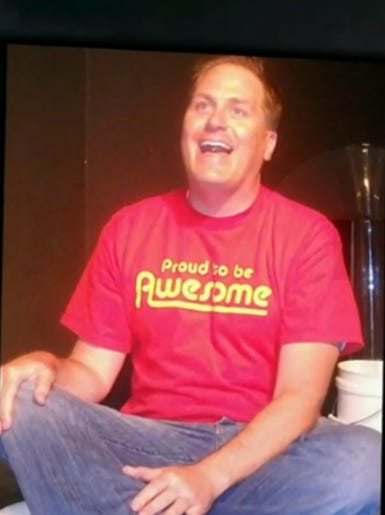If those of us who swarm the earth, devouring it and making noise, and those of us whose bodies became incompatible with life and gave out, if we are not always among each other in some way, then how did Dr. Lockwood tap me on the shoulder last week?
And why did this happen within a day of the four-year anniversary - unbeknownst to me - of his death?
Nobody told me, or had a reason. Two summers later, I heard the news by “coincidence.” (Not much of a believer in those. The phenomenon of adjacent goings-on can’t be denied, of course. But reality is … more).
*
One morning in 2017 I woke with searing pain in my neck and left shoulder after sleeping awkwardly, upright on the sofa, head on my chin. “You know, I’ve done the same thing myself.” Dr. Frank Lockwood at the urgent-care clinic downstairs from our apartment. Middle-aged, white-smocked, uncommonly cheerful. Attentive.
He manipulated my arm carefully. Diagnosed a pinched nerve, recommended a neurology specialist, and wrote me a prescription for - hang onto your hat - hydrocodone! The legalized scourge of American life, in a drug class that’s been about as hard to wring out of doctors as antibiotics. Over-used. Resistance problems. Come back in a week and we’ll see. “I know all about the opioid epidemic,” Dr. Lockwood said. “I’m not going to let my patients suffer.”
Before I could schedule an appointment with the booked-up specialist, I ran out of pills. Ahead was a trip to Austin where my son was graduating from his poetry fellowship. And I was still in agony.
Dr. Lockwood phoned in a sizable refill, much bigger than the first. At the pharmacy, a sullen staffer fixed me with lizard eyes as she handed over the stapled sack. How did you get this hookup, she’s thinking. How can I get it.
Time passed. My neck and shoulder pain subsided, COVID-19 swept across the world, and 2022 dawned. We ordered food delivery. The kid rang me down when it arrived.
“Hey,” the kid said, nodding at the urgent-care sign. “That’s where my dad’s doctor worked. Dr. Lockwood. Do you know him?”
I said yes. “Haven’t seen him in a while.”
The kid went quiet for a beat. “He, um, passed away.”
Another silence.
I said, “Well, how’s your dad?”
“Oh, he passed away, too. But he was up in years. Sixties.”
I said, “I’m 67.”
We hung there for a moment.
“Enjoy your dinner!” He ran to the car.
About five minutes later my phone buzzed. The kid again.
“I just wanted to tell you, um, my mom is riding with me and” – I could hear the mom shush him, or try to, or wanting to seem to try to – “and she thinks you’re attractive.”
Old people never hear this. I thanked his mom, who no doubt was listening on speaker, said she had made my night, and explained that I was married.
The story, I thought later, had everything. Love, death, loneliness. Sustenance of more than one kind. How long had she been without a husband, her son without a dad?
*
Dr. Lockwood, 54, caught COVID-19 from a patient and lasted six weeks before surrendering that August in 2020. It was in the newspaper but I don’t read newspapers. It was on TV but I don’t watch TV. The media covered the story because he was also an improv actor and friend to many in Atlanta theater.
He once appeared briefly on “Who Wants to be a Millionaire?” Dr. Lockwood wanted to. His brother, a lawyer, wrote in a published column that “even though he was great at his job, the practice of medicine, in many ways, just paid the bills.”
I wish I knew how to end a narrative like this. Or what to do about narratives that don’t end but keep unspooling in unpredictable ways, at least for a while as we retell them. Sustenance, I guess, of yet another kind.





So tragic. I'm sorry.
Love this piece, especially the shoulder tap.